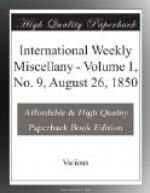intensest stress of mental energy; yet the manner is
never discomposed; the decency and propriety of the
display never interfered with; he is always greater
than his genius; you see “the depth out not
the tumult” of the mind. Whether, with extended
arm, he strangles the “reluctantes dracones”
of democracy, or with every faculty called home, concentrates
the light and heat of his being in developing into
principles those great sentiments and great instincts
which are his inspiration; in all, the orator stands
forth with the majesty and chastened grace of Pericles
himself. In the fiercest of encounters with the
deadliest of foes, the mind, which is enraged, is never
perturbed; the style, which leaps like the fire of
heaven, is never disordered. As in Guido’s
picture of St. Michael piercing the dragon, while
the gnarled muscles of the arms and hands attest the
utmost strain of the strength, the countenance remains
placid, serene, and undisturbed. In this great
quality of mental dignity, Mr. Webster’s speeches
have become more and more eminent. The glow and
luster which set his earlier speeches a-blaze with
splendor, is in his later discourses rarely let forth;
but they have gained more, in the increase of dignity,
than they have parted with in the diminution of brilliancy.
We regard his speech before the shop-keepers, calling
themselves merchants, of Philadelphia, as one of the
most weighty and admirable of the intellectual efforts
of his life. The range of profound and piercing
wisdom; the exquisite and faultless taste; but above
all, the august and indefectible dignity, that are
illustrated from the beginning to the end of that
great display of matured and finished strength, leave
us in mingled wonder and reverence. There is
one sentence there which seems to us almost to reach
the intellectual sublime; and while it stirs
within us the depths of sympathy and admiration, we
could heartily wish that the young men of America
would inhale the almost supra-mortal spirit which it
breathes: “I would not with any idolatrous
admiration regard the Constitution of the United States,
nor any other work of man; but this side of idolatry,
I hold it in profound respect. I believe that
no human working on such a subject, no human ability
exerted for such an end, has ever produced so much
happiness, or holds out now to so many millions of
people the prospect, through such a succession of ages
and ages, of so much happiness, as the Constitution
of the United States. We who are here for one
generation, for a single life, and yet in our several
stations and relations in society intrusted in some
degree with its protection and support, what duty
does it devolve, what duty does it not devolve,
upon us!” In the name of distant ages, and a
remote posterity, we hail the author of this and similar
orations, as Webster the Olympian.
But we leave a subject which we have incidentally touched, sincerely disclaiming any attempt to estimate the character or define the greatness of Webster. In reference to him we feel, as Cicero said to Caesar, “Nil vulgare te dignum videri possit.”




